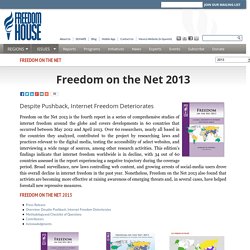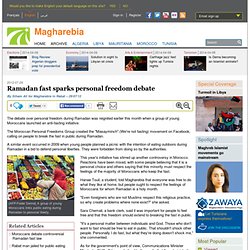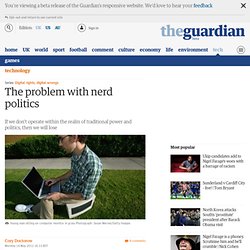

Freedom on the Net 2013. Despite Pushback, Internet Freedom Deteriorates Freedom on the Net 2013 is the fourth report in a series of comprehensive studies of internet freedom around the globe and covers developments in 60 countries that occurred between May 2012 and April 2013.

Over 60 researchers, nearly all based in the countries they analyzed, contributed to the project by researching laws and practices relevant to the digital media, testing the accessibility of select websites, and interviewing a wide range of sources, among other research activities. This edition's findings indicate that internet freedom worldwide is in decline, with 34 out of 60 countries assessed in the report experiencing a negative trajectory during the coverage period. Broad surveillance, new laws controlling web content, and growing arrests of social-media users drove this overall decline in internet freedom in the past year.
Rights & Liberties. Ramadan fast sparks personal freedom debate. The debate over personal freedom during Ramadan was reignited earlier this month when a group of young Moroccans launched an anti-fasting initiative.

The Moroccan Personal Freedoms Group created the "Masayminch" (We're not fasting) movement on Facebook, calling on people to break the fast in public during Ramadan. A similar event occurred in 2009 when young people planned a picnic with the intention of eating outdoors during Ramadan in a bid to defend personal liberties. They were forbidden from doing so by the authorities. This year's initiative has stirred up another controversy in Morocco. Reactions have been mixed, with some people believing that it is a personal choice and others saying that this minority must respect the feelings of the majority of Moroccans who keep the fast. Hanae Touil, a student, told Magharebia that everyone was free to do what they like at home, but people ought to respect the feelings of Moroccans for whom Ramadan is a holy month.
Why Are the London Olympics so Afraid of Graffiti Artists? With less than a week before the opening of the 2012 Summer Olympics in London, England, anticipation and some dread both fill the air. Ever since the Munich games in 1972, the specter of terrorism comes to play as much as the greatest athletes in the world. It’s estimated that as much as £553 million (or approximately $864 million USD) will be spent on security for the London games.
Authorities are looking for any edge they can get to keep people safe, but an unlikely “edge” was sought recently by the “raiding” of graffiti artists in England in a preemptive strike against possible graffiti-related attacks during the games. The problem with nerd politics. In the aftermath of the Sopa fight, as top Eurocrats are declaring the imminent demise of Acta, as the Trans-Pacific Partnership begins to founder, as the German Pirate party takes seats in a third German regional election, it's worth taking stock of "nerd politics" and see where we've been and where we're headed.

Since the earliest days of the information wars, people who care about freedom and technology have struggled with two ideological traps: nerd determinism and nerd fatalism. Both are dangerously attractive to people who love technology. In "nerd determinism," technologists dismiss dangerous and stupid political, legal and regulatory proposals on the grounds that they are technologically infeasible.
Geeks who care about privacy dismiss broad wiretapping laws, easy lawful interception standards, and other networked surveillance on the grounds that they themselves can evade this surveillance. What's more, things that aren't legal don't attract monetary investment. Brutal Crackdown in Belarus. PRAGUE, Feb 9, 2011 (IPS) - Repressions in Europe’s last dictatorship show no signs of abating despite EU sanctions and international condemnation. International rights watchdogs warn that human rights abuses in Belarus have reached a "new low", and activists say that no one appears safe from Alexander Lukashenka’s brutal crackdowns in the wake of his controversial re-election as president.
The events in Belarus echo have emerged in many ways as a European parallel of what is happening in Egypt and much of the Arab world. Daria Vashkevich of the Assembly of Pro-Democratic NGOs of Belarus told IPS: "There are repressions all over the country and it’s not just NGOs that are being made to suffer. Human rights organisations, people who were monitoring elections and checking on rights violations, are the ones being targeted for repressions first, but it’s impossible to be sure of anything at the moment. "
Freedom of the press/media/information.